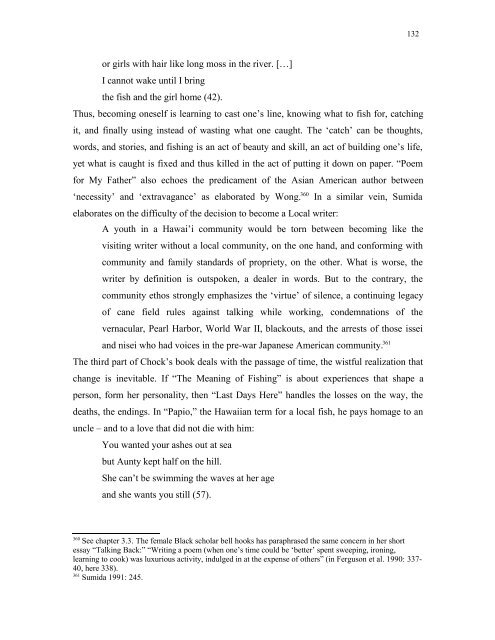A Paradise Lost - KOPS - Universität Konstanz
A Paradise Lost - KOPS - Universität Konstanz
A Paradise Lost - KOPS - Universität Konstanz
Create successful ePaper yourself
Turn your PDF publications into a flip-book with our unique Google optimized e-Paper software.
or girls with hair like long moss in the river. […]<br />
I cannot wake until I bring<br />
the fish and the girl home (42).<br />
Thus, becoming oneself is learning to cast one’s line, knowing what to fish for, catching<br />
it, and finally using instead of wasting what one caught. The ‘catch’ can be thoughts,<br />
words, and stories, and fishing is an act of beauty and skill, an act of building one’s life,<br />
yet what is caught is fixed and thus killed in the act of putting it down on paper. “Poem<br />
for My Father” also echoes the predicament of the Asian American author between<br />
‘necessity’ and ‘extravagance’ as elaborated by Wong. 360 In a similar vein, Sumida<br />
elaborates on the difficulty of the decision to become a Local writer:<br />
A youth in a Hawai’i community would be torn between becoming like the<br />
visiting writer without a local community, on the one hand, and conforming with<br />
community and family standards of propriety, on the other. What is worse, the<br />
writer by definition is outspoken, a dealer in words. But to the contrary, the<br />
community ethos strongly emphasizes the ‘virtue’ of silence, a continuing legacy<br />
of cane field rules against talking while working, condemnations of the<br />
vernacular, Pearl Harbor, World War II, blackouts, and the arrests of those issei<br />
and nisei who had voices in the pre-war Japanese American community. 361<br />
The third part of Chock’s book deals with the passage of time, the wistful realization that<br />
change is inevitable. If “The Meaning of Fishing” is about experiences that shape a<br />
person, form her personality, then “Last Days Here” handles the losses on the way, the<br />
deaths, the endings. In “Papio,” the Hawaiian term for a local fish, he pays homage to an<br />
uncle – and to a love that did not die with him:<br />
You wanted your ashes out at sea<br />
but Aunty kept half on the hill.<br />
She can’t be swimming the waves at her age<br />
and she wants you still (57).<br />
360 See chapter 3.3. The female Black scholar bell hooks has paraphrased the same concern in her short<br />
essay “Talking Back:” “Writing a poem (when one’s time could be ‘better’ spent sweeping, ironing,<br />
learning to cook) was luxurious activity, indulged in at the expense of others” (in Ferguson et al. 1990: 337-<br />
40, here 338).<br />
361 Sumida 1991: 245.<br />
132

















